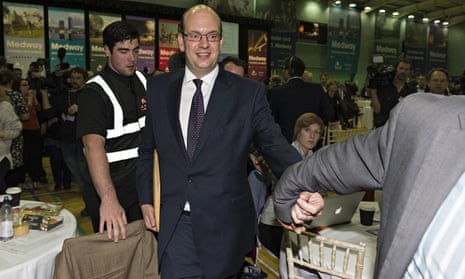If the seemingly irresistible rise of Ukip teaches us anything, it is that sentiment all too often trumps reality and mere detail in politics. The party is a self-described “People’s Army”, now emboldened by a victory in Rochester and Strood it hopes will bring renewed momentum. Its voters are disproportionately working class.
Polls suggest they support renationalising rail and energy and want higher taxes for the rich and an increased minimum wage. According to research by the academic Matthew Goodwin, 81% of Ukip supporters believe “big business takes advantage of ordinary people”; a slim majority want the government to redistribute income; and they overwhelmingly agree “there is one law for the rich and one for the poor”.
These are beliefs soaked in leftwing populism; and yet those who subscribe to them have flocked in droves to a party of the hard right. Ukip’s leaders now defiantly, unapologetically present themselves as a people’s insurgency against a contemptuous establishment.
“The radical tradition, which has stood and spoken for the working class, has found a new home in Ukip,” declared the triumphant Mark Reckless, claiming – with no little chutzpah – to stand in the tradition of the Levellers, Chartists and the suffragettes. Here are movements that defied the powerful and attempted to build a more equitable order. And yet Ukip is led by a privately educated ex-City broker; one of their two privately educated ex-Tory MPs worked in the City, the other in asset management; and they are bankrolled by ex-Tory multimillionaires.
Their policies are erratic, but their leading lights have pledged support for slashing taxes on the rich, privatising public services and repealing basic workers’ rights.
Sentiments, though. Just 36% of voters believe that Nigel Farage was privately educated, even though he was schooled at the prestigious fee-paying Dulwich College; over half believe the same for the state-educated Ed Miliband. Farage has successfully effected an everyman appeal, complete with the almost compulsory pint of bitter at every photographic opportunity. He doesn’t sound scripted, but rather talks in the language of common sense; he presents himself as the outsider against the machine. In a world of relentlessly on-message, professionalised career politicians, it takes little to shine.
You can see why Ukip are an attractive prospect to Tory MPs. The Conservatives are in long-term decline; they haven’t won a general election since 1992; they are unable to win over working class voters in many communities where they once prospered. The baggage of Thatcherism and de-industrialisation drags them down.
Ukip are not associated with this baggage: perversely, given their leaders are really unabashed ultra-Thatcherites. But, again, it’s all about sentiments: Ukip present an entirely fabricated chasm between them and the Tories. In both Clacton and Rochester, voters were frequently reported to be voting for Ukip because the incumbent Tory had done nothing for them.
And sentiments bring us to perhaps the most infamous tweet ever issued by a British politician: Emily Thornberry’s picture of a terraced house adorned with St George’s flags and a white van parked outside.
Over the last generation or so, working class identity, culture and community have faced a relentless battering. Many of the old skilled jobs – back-breaking and male-dominated as they could be –gave people a sense of pride, but were stripped from the economy. Industries that were once the focal point of communities disintegrated. A sense of solidarity, sometimes cemented by a strong trade union movement, was eroded.
In some working class communities, a sense of Englishness filled the vacuum. I grew up near the centre of Stockport: publicly displayed English flags were not uncommon. “I am here, and I am proud,” was the implicit, defiant cry. The rise of Scottish national consciousness has only accelerated the process.
Anything that seems to impugn this sentiment can be seen as the ultimate insult: but if it originates from the political elite, it can be particularly explosive. Politicians are deeply unpopular in modern Britain. They are generally regarded as privileged, self-aggrandising, out-of-touch, and in-it-for-themselves.
In the case of many MPs, some or all of this is unfair. But what is true is that the political elite is deeply unrepresentative of the British people. Parliament is dominated by white middle class professional men; just 4% are manual workers by background; and, in a revealing indication of how professionalised politics has become, while just 21 MPs worked in politics before their election in 1979, it had jumped to 90 by 2010. They don’t look like us, many voters think; they don’t understand us; and secretly, they probably have contempt for us and sneer at us. Any evidence that this sentiment is indeed well founded is as politically explosive as it gets. If there were more prominent MPs from working class backgrounds, the problem would be less acute. But then again, Emily Thornberry was one of the few Labour frontbenchers to grow up on a council estate.
There have been many generalisations in the course of this incident that should surely be challenged, though. A damning subtext of the response to this whole episode is that the working class is a homogenous group, all with the same set of identities and beliefs.
As a general rule – whatever our class – the English do not tend to flaunt the flag apart from, say, sporting occasions. In the US and France the flag is commonplace, but it is associated with those countries’ revolutions and a sentiment of popular sovereignty.
The flags of Britain do not have the same connotations of “the people”. For many non-white people – including working class people on council estates – the St George’s cross is dripping with whiteness in every sense. To a sizeable proportion of the population, flaunting the flag sometimes seems territorial and exclusive, perhaps even intimidating.
And there are double standards at play. British politicians all too often demonise or caricature entire swathes of their own people and get away with it. Senior Tories have characterised unemployed people as “skivers” and “shirkers”; George Osborne spoke of the “closed blinds” of those “sleeping off a life on benefits”. Lord Freud spoke of disabled people who were “not worth” the minimum wage, and remained in post. The Sun is fanning the outrage over Thornberry’s tweet, yet a court was told this week that their reporters referred to their own readers as “plebs”. A Daily Telegraph blogger berates Thornberry, and yet once wrote a piece suggesting that the murder of an Iranian immigrant “has exposed the other side of working class Britain. The intolerance. The suspicion of distinctiveness.” Demonisation is rampant, all too conveniently justifying policies that hammer working class people.
But what lessons for those who resist the Ukipisation of British politics? Easy to feel mortified, depressed, despondent about the direction the country is heading down. But lessons have to be learned. The debate over the future of Britain will not be won by facts and mere details. We now know that sentiments matter. If a populist-minded left would learn these lessons – well, perhaps the rise of Ukip would not seem quite as irresistible as it seems today.

